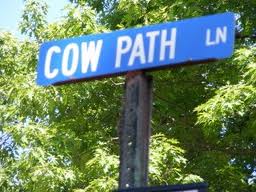 Welcome to O.D. Fridays at DonorDreams blog. Every Friday for the foreseeable future we will be looking more closely at a recent post from John Greco’s blog called “johnponders ~ about life at work, mostly” and applying his organizational development messages to the non-profit community.
Welcome to O.D. Fridays at DonorDreams blog. Every Friday for the foreseeable future we will be looking more closely at a recent post from John Greco’s blog called “johnponders ~ about life at work, mostly” and applying his organizational development messages to the non-profit community.
Today, we’re focusing on a post that John titled “The Cow Path“. In that post, he talks about cow paths that started hundreds of years ago and somehow have turned into urban roads we drive on today. Of course, there is a classic organizational development point of view at the middle of John’s post. In a nutshell, his point is threefold:
- It is relatively easy for organizations to start new initiatives.
- It is very, very easy for organizations to continue doing what they’ve always done.
- It is downright difficult to stop doing things your organization (e.g. staff, board members, volunteers, and donors) have become accustom to doing.
If you haven’t done so already, please make sure that you take a moment to click over to John’s post because he does a very nice job of illustrating this point. Heck, he even uses a poem from Samuel Walter Foss in his post to drive home this point.
 When I read “The Cow Path,” I had to chuckle because it describes so many small non-profit organizations that understand the need to change their resource development approach but don’t understand the threefold organizational development principle laid about in John’s blog post.
When I read “The Cow Path,” I had to chuckle because it describes so many small non-profit organizations that understand the need to change their resource development approach but don’t understand the threefold organizational development principle laid about in John’s blog post.
Let’s look at an example of a typical non-profit organization that I’ve worked with since the economic crash of 2008:
- Start a resource development or annual campaign planning process (aka start a new initiative)? Responses range from a hesitant maybe to a lukewarm yes.
- Stop pursuing more and more government money? Responses range from polite resistance to outright defiance.
- Stop running so many special events (and stop trying to add “just one more event)? Responses range from polite resistance to outright defiance.
- Stop recruiting board members who don’t want to fundraise and who don’t have any skills and experiences with fundraising? Responses range from polite resistance to outright defiance.
- Continue writing grants, chasing government funding, running special events, and recruiting warm bodies to sit in the boardroom? You betcha! Full steam ahead.
 Why is status quo normally the victor in 70% of change initiatives? Because “we’ve always done it that way” is the enemy of “OMG, there is an iceberg ahead and we need to change course immediately“.
Why is status quo normally the victor in 70% of change initiatives? Because “we’ve always done it that way” is the enemy of “OMG, there is an iceberg ahead and we need to change course immediately“.
In John’s post, he talks about an exercise he uses called “Stop-Start-Continue”. I’ve been through a similar exercise facilitate by Noel Tichy called “Rattlesnakes and Pythons”. Click here “to read a short description of it in Tichy’s book titled “The Cycle of Leadership”.
Unfortunately, my experience with “Rattlesnakes and Pythons” was similar to John’s findings with “Stop-Start-Continue”. Even when things were identified as needing to be eliminated or squeezed out, there was great resistance to it and sometimes it didn’t happen.
In the end, John is right. As always! There is only one person to blame when change is allegedly out of reach, and we continue doing the same thing over and over again with an anticipated different result.
What a load of BS! Grab that bull by the horns and make some change happen.
If you took 15 seconds and wrote down a few things that you know need to be eliminated from your non-profit organization’s modus operandi, what would be on your list? What process have you used in the past to identify things that need to change at your agency? How effective where you at eliminating those things? Please use the comment box to share your answers.
Here’s to your health!
Erik Anderson
Founder & President, The Healthy Non-Profit LLC
www.thehealthynonprofit.com
erik@thehealthynonprofit.com
http://twitter.com/#!/eanderson847
http://www.facebook.com/eanderson847
http://www.linkedin.com/in/erikanderson847

One comment